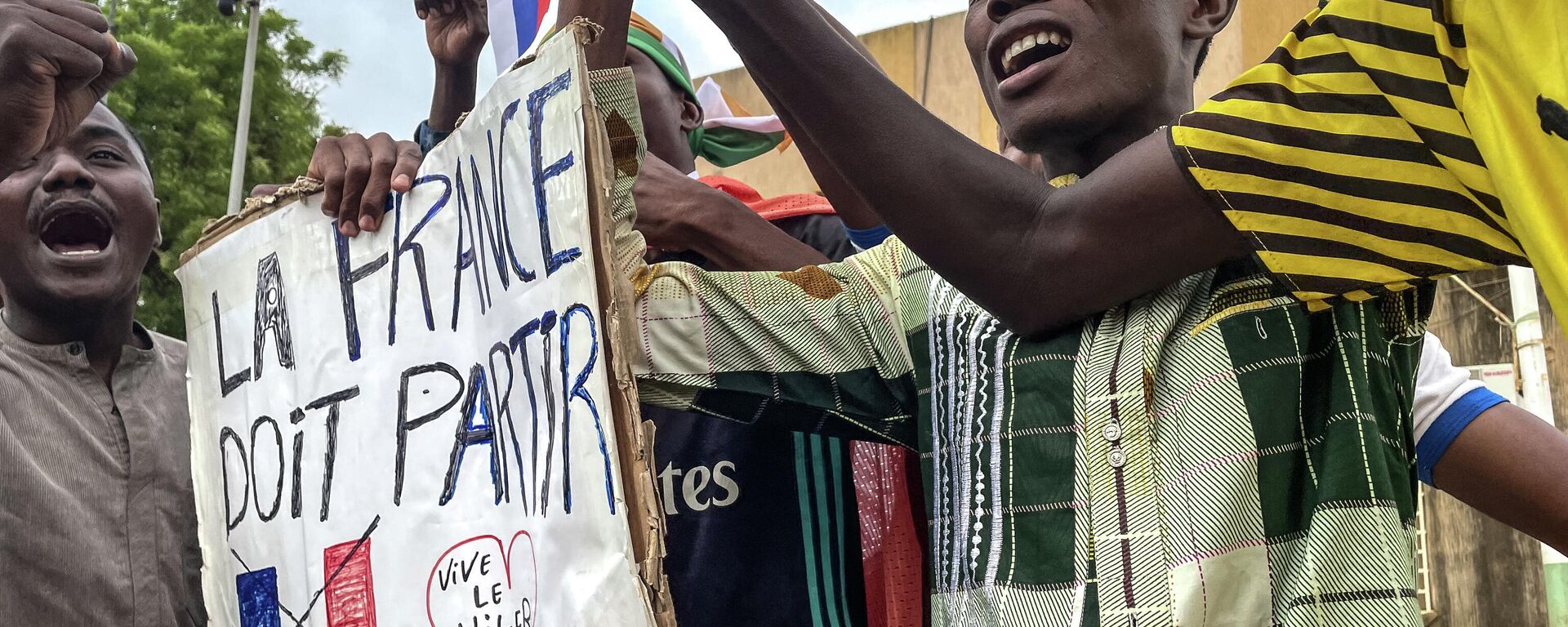https://en.sputniknews.africa/20230809/1061192518.html
Russian Flag in Hands of African Anti-Colonialists Has 'Spooked' West
Russian Flag in Hands of African Anti-Colonialists Has 'Spooked' West
Sputnik Africa
The sight of the Russian flag at demonstrations in support of Niger's military leadership has scared Western nations. Africa expert and political analyst Koffi... 09.08.2023, Sputnik Africa
2023-08-09T14:28+0200
2023-08-09T14:28+0200
2023-08-09T14:28+0200
sub-saharan africa
west
russia
sputnik
economic community of west african states (ecowas)
mohamed bazoum
niger
https://cdn1.img.sputniknews.africa/img/07e7/08/09/1061192697_0:0:2952:1662_1920x0_80_0_0_afa7b07a7b7803efc000575d802c04e7.jpg
Nigeriens waving the Russian flag has French, US, and other Western leaders "spooked," an academic says.The military leadership that deposed Mohamed Bazoum as president has defied an ultimatum from former colonial power France and regional bloc Economic Community of West African States (ECOWAS) to return him to power.In turn, the new government has ordered France and the US to vacate their military bases in the West African country and has halted sales of uranium ore to France, where it accounts for one-third of electricity generation.Political Analyst Koffi Kouakou told Sputnik that it was "fascinating" to see the "paradox" of Western leaders blaming Russia for the military takeover in Niger when their own armed forces trained the officers responsible for similar events in neighboring countries.To Africans, Russia represents cooperation, economic development, and an alliance against imperialism, the academic stressed. By contrast, the West is painting Russia as a malevolent force on the continent.According to him, Africans want Russia to help the continent, the Russian flag is a "symbol that it's helping them to rally around the idea of freedom."The visit to Niger this week by US Assistant Secretary of State Victoria Nuland — the architect of the 2014 Euromaidan coup in Ukraine — has failed to intimidate the country's new rulers into restoring Bazoum to the presidency or lifting their embargo on uranium supplies to France.The academic said the series of military takeovers in France's former colonies in West Africa was not unsurprising — or unpopular.
https://en.sputniknews.africa/20230808/end-of-francafrique-french-senators-point-to-paris-consecutive-failures-in-africa-1061152891.html
west
russia
niger
Sputnik Africa
feedback@sputniknews.com
+74956456601
MIA „Rossiya Segodnya“
2023
News
en_EN
Sputnik Africa
feedback@sputniknews.com
+74956456601
MIA „Rossiya Segodnya“
Sputnik Africa
feedback@sputniknews.com
+74956456601
MIA „Rossiya Segodnya“
west, russia, sputnik, economic community of west african states (ecowas), mohamed bazoum, niger
west, russia, sputnik, economic community of west african states (ecowas), mohamed bazoum, niger
Russian Flag in Hands of African Anti-Colonialists Has 'Spooked' West
The sight of the Russian flag at demonstrations in support of Niger's military leadership has scared Western nations. Africa expert and political analyst Koffi Kouakou, a senior research fellow at the Center for Africa-China Studies at the University of Johannesburg, said Russia has a long history of aiding African struggles against colonialism.
Nigeriens waving the Russian flag has French, US, and other Western leaders "spooked," an academic says.
The military leadership that deposed Mohamed Bazoum as president has defied an ultimatum from former colonial power France and regional bloc Economic Community of West African States (
ECOWAS) to return him to power.
In turn, the new government has ordered France and the US to vacate their military bases in the West African country and has halted sales of uranium ore to France, where it accounts for one-third of electricity generation.
Political Analyst Koffi Kouakou told Sputnik that it was "fascinating" to see the "paradox" of Western leaders blaming Russia for the military takeover in Niger when their own armed forces trained the officers responsible for similar events in neighboring countries.
"The Russian flag has been just appearing almost everywhere now. It's got symbolism to it, but it's also got practicality to it," he said. "One of the practicalities is it seems those who are raising the flags, at least across the Sahel, are now saying to themselves: 'my goodness, we need somebody else to help us, we are so weak, we're not strong enough and we can't go back to the whole Stockholm Syndrome, were we are continuously praising those who are oppressing us."
To Africans, Russia represents cooperation, economic development, and an alliance against imperialism, the academic stressed. By contrast, the West is painting Russia as a malevolent force on the continent.
According to him, Africans want Russia to help the continent, the Russian flag is a "symbol that it's helping them to rally around the idea of freedom."
"The old traditional British English word for flag was 'standard,' which means something that stands for something, something that's really flying out. The West is just sort of spooked by this awakening from Africans, and they're still trying to figure out 'why Russia,' when we've been there with them for a long time, but they're not questioning themselves and the kind of thing that they've done," Kouakou stressed.
The visit to Niger this week by US Assistant Secretary of State Victoria Nuland — the architect of the 2014 Euromaidan coup in Ukraine — has failed to intimidate the country's new rulers into restoring Bazoum to the presidency or lifting their embargo on uranium supplies to France.
"If you take a serious assessment of Western legacy, especially France and the UK and Europeans and now the United States... if you take a look at the assessment of their legacy of colonialism, 'the relationship,' it's just not been positive at all," Kouakou said.
The academic said the series of military takeovers in
France's former colonies in West Africa was not unsurprising — or unpopular.
"There's a combination between a rising movement of discontented civil servants, civilians and population saying: 'we have just had enough, we really don't want you here anymore, we can deal with our own issues,'" Kouakou noted. "And the military is probably one of the rallying points of force, of power, that the populace are now saying: 'We're going to use you to really help us get rid of most of these colonialists.'"


